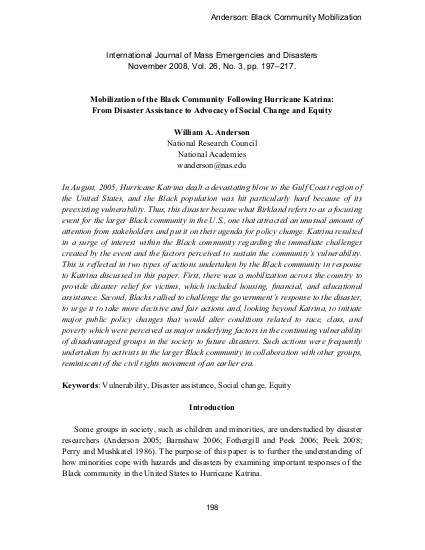
In August, 2005, Hurricane Katrina dealt a devastating blow to the Gulf Coast region of the United States, and the Black population was hit particularly hard because of its preexisting vulnerability. Thus, this disaster became what Birkland refers to as a focusing event for the larger Black community in the U.S., one that attracted an unusual amount of attention from stakeholders and put it on their agenda for policy change. Katrina resulted in a surge of interest within the Black community regarding the immediate challenges created by the event and the factors perceived to sustain the community’s vulnerability. This is reflected in two types of actions undertaken by the Black community in response to Katrina discussed in this paper. First, there was a mobilization across the country to provide disaster relief for victims, which included housing, financial, and educational assistance. Second, Blacks rallied to challenge the government’s response to the disaster, to urge it to take more decisive and fair actions and, looking beyond Katrina, to initiate major public policy changes that would alter conditions related to race, class, and poverty which were perceived as major underlying factors in the continuing vulnerability of disadvantaged groups in the society to future disasters. Such actions were frequently undertaken by activists in the larger Black community in collaboration with other groups, reminiscent of the civil rights movement of an earlier era.
Links
Resource collections
- Cyclones, hurricanes & typhoons
- Learning from crises
- Topics
- UN Habitat - Urban Response Collection
- Urban Response - Urban Crisis Preparedness and Risk Reduction
- Urban Response Collection - Community Engagement and Social Cohesion
- Urban Response Collection - Economic Recovery
- Urban Response Collection - Environment and Climate Change
- Urban Response Collection - Housing, Land and Property
- Urban Response Collection - Urban Crisis Response, Recovery and Reconstruction
- Urban Response Collection - Urban Resilience
